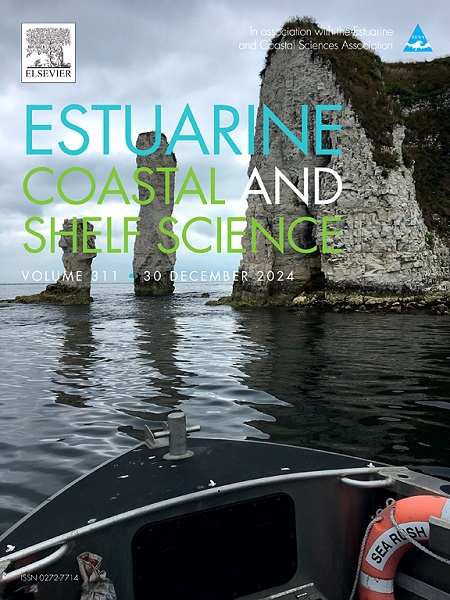Variations in litterfall dynamics, root biomass, and sediment accretion in restored and recolonized mangroves in Leyte, Philippines
IF 2.6
3区 地球科学
Q1 MARINE & FRESHWATER BIOLOGY
引用次数: 0
Abstract
Litterfall production and decay, root biomass, and sediment accretion dynamics were investigated from restored ‘planted’ (R5, R8, R15, and R30 stands) and recolonized stands (C5, C12, and C20 stands) to investigate patterns in primary productivity, belowground biomass, and sediment accretion dynamics. Litterfall data was collected using litter traps over 12 months, while decay kinetics was investigated using a litterbag experiment. Root biomass and sediment accretion data were collected using makeshift acrylic corers. Litterfall production increased as stands aged, and tended to stabilize as it matured in restored (R8: 10.05 Mg/ha/yr; R30: 6.1 Mg/ha/yr) and recolonized stands (C5: 18.75 Mg/ha/yr; C20: 9.05 Mg/ha/yr). Leaf litter decay rates (K/d) showed no pattern with stand age, although the recolonized stands (range: 0.059–0.113 K/d) had lower decay rates compared to the restored (range: 0.073–0.123 K/d) and natural stands (range: 0.064–0.123 K/d). Root biomass declined with age in restored stands (R5: 67.16 Mg/ha, R30: 49.67 Mg/ha), but increased in recolonized stands (C5: 5.41 Mg/ha, C20: 19.50 Mg/ha). Very high rates of sediment accretion were found in younger restored (R5: 10.1 cm/yr) and recolonized stands (C5: 8.1 cm/yr) than mature stands (R30: 6.3 cm/yr; C20: 4.3 cm/yr). Our results showed disparities of patterns in mangrove vegetation growth in recolonized stands and huge potential contribution on mangrove productivity when these areas are effectively restored.
菲律宾莱特岛经过恢复和重新定居的红树林的落叶动态、根系生物量和沉积物沉积量的变化
对恢复 "种植 "林分(R5、R8、R15 和 R30 林分)和重新定居林分(C5、C12 和 C20 林分)的垃圾降生和腐烂、根系生物量和沉积物沉积动力学进行了调查,以研究初级生产力、地下生物量和沉积物沉积动力学的模式。使用垃圾收集器收集了 12 个月的垃圾降量数据,并使用垃圾袋实验研究了腐烂动力学。使用临时丙烯酸取样器收集了根系生物量和沉积物吸积数据。落叶量随着林分的老化而增加,在恢复林分(R8:10.05 兆克/公顷/年;R30:6.1 兆克/公顷/年)和重新植被林分(C5:18.75 兆克/公顷/年;C20:9.05 兆克/公顷/年)中,落叶量随着林分的成熟而趋于稳定。叶屑腐烂率(K/d)与林分年龄没有规律可循,但与恢复林分(范围:0.073-0.123 K/d)和自然林分(范围:0.064-0.123 K/d)相比,重新定居林分(范围:0.059-0.113 K/d)的腐烂率较低。修复林分(R5:67.16 兆克/公顷,R30:49.67 兆克/公顷)的根系生物量随着年龄的增长而下降,但在再植林分中却有所增加(C5:5.41 兆克/公顷,C20:19.50 兆克/公顷)。与成熟林分(R30:6.3 厘米/年;C20:4.3 厘米/年)相比,年轻的恢复林分(R5:10.1 厘米/年)和移居林分(C5:8.1 厘米/年)的沉积物增加率非常高。我们的研究结果表明,在重新定居的林分中,红树林植被的生长模式存在差异,如果这些区域得到有效恢复,将对红树林的生产力产生巨大的潜在贡献。
本文章由计算机程序翻译,如有差异,请以英文原文为准。
求助全文
约1分钟内获得全文
求助全文
来源期刊
CiteScore
5.60
自引率
7.10%
发文量
374
审稿时长
9 months
期刊介绍:
Estuarine, Coastal and Shelf Science is an international multidisciplinary journal devoted to the analysis of saline water phenomena ranging from the outer edge of the continental shelf to the upper limits of the tidal zone. The journal provides a unique forum, unifying the multidisciplinary approaches to the study of the oceanography of estuaries, coastal zones, and continental shelf seas. It features original research papers, review papers and short communications treating such disciplines as zoology, botany, geology, sedimentology, physical oceanography.

 求助内容:
求助内容: 应助结果提醒方式:
应助结果提醒方式:


